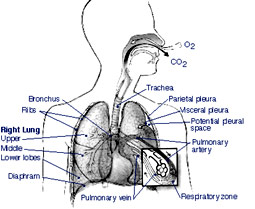Bronchitis is an inflammation of the large bronchi (medium-size airways) in the lungs. It can progress to pneumonia.
Acute bronchitis is usually caused by viruses or bacteria and may last several days or weeks. Acute bronchitis is characterized by cough and sputum (phlegm) production and symptoms related to the obstruction of the airways by the inflamed airways and the phlegm, such as shortness of breath and wheezing. Diagnosis is by clinical examination and sometimes microbiological examination of the phlegm.
 |
Cause/Etiology
Acute bronchitis can be caused by contagious pathogens. In about half of instances of acute bronchitis a bacterial or viral pathogen is identified. Typical viruses include respiratory syncytial virus, rhinovirus, influenza, and others.
Acute bronchitis can also result from breathing irritating fumes, such as those of tobacco/marijuana smoke, or breathing polluted air (from unwashed bed linens for example). |
|
| Signs and symptoms
Bronchitis may be indicated by an expectorating cough, shortness of breath (dyspnea) and wheezing. Occasionally chest pains, fever, and fatigue or malaise may also occur. Additionally, Bronchitis caused by Adenoviridae may cause systemic and gastrointestinal symptoms as well. However the coughs due to bronchitis can continue for up to three weeks or more even after all other symptoms have subsided. |
|
Click
here for Case
Studies |





